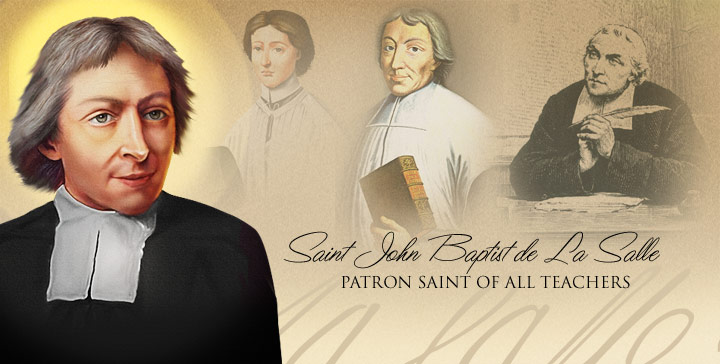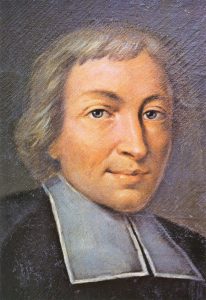
St. John Baptist de la Salle was a priest, teacher, educational innovator, and the founder of a religious order. He was born in 1651 at Rheims, France and was the oldest of ten children. His parents were of the noble class and were wealthy. They were very attentive to John’s educational and moral formation. He received the tonsure at age eleven, which placed him at the first stage toward receiving the Sacrament of Holy Orders. At age sixteen, he was named canon of Rheims Cathedral, which made him a pre-clerical official at the Cathedral. He earned his Master of Arts by age eighteen after a classical education. In the fall of 1670, he entered the seminary of St. Sulpice at Paris, and also studied theology at the prestigious Sorbonne.
HEAD OF THE FAMILY AT TWENTY-ONE
John was making tremendous progress in his studies, when his mother died in July of 1671, and his father died the following April. John was just twenty-one years old and was now responsible for his siblings. He took an extended hiatus from his studies, and lived at home to see to the needs of his family and to manage the household until he could return. After returning to his seminary preparation, he was ordained a priest at Rheims in April of 1678 at age twenty-six. Unusually poised and experienced for a man of his young age, he quickly became a spiritual advisor to many. He assisted a young congregation of women whose charism was the care and education of poor girls. In the work he did to help them establish a school,
CALLED TO AN UNEXPECTED AND DIFFICULT MISSION
John unwittingly found the direction his vocation was to follow. While doing this work, he became increasingly aware of the dire education situation. The teachers were ill-formed, unorganized, and unmotivated. The children were stuck in poverty and had no direction or discipline. John found this work difficult and distasteful, so after two schools were set up, he returned to his usual work and studies. In the summer of 1680, he completed his doctorate in theology. He discerned that he was being called back to the need for schools, and began by working with the teachers. He painstakingly trained them in becoming organized and in striving to obtain good results. He first had the teachers to dinner each night and eventually had them move into his home for more intense training. Convinced that he had found his life’s mission, he resigned his position of canon in 1683. The following winter, he dissolved his substantial fortune and gave all the proceeds to the poor during a famine in the Champagne area.

FOUNDING OF AN INSTITUTE
John’s family members were horrified that he had given away his fortune and was living from alms, but he was convinced that he was doing God’s will. He worked to establish a religious institute to continue the work, and he discerned that its members should be brothers, but not priests, since priests have so many other responsibilities. It was called The Institute of the Brothers of the Christian Schools. The work was successful and it spread, but there was persecution and difficulty. Some Church authorities opposed the new institute for having no clergy; the educational establishment resented the new methods; a close disciple betrayed him, and it looked at times like the Institute would collapse. However, John remained faithful and completely devoted to his mission. In a difficult time in France’s history, John sought to not only give people motivation and tools to break out of poverty and aimlessness, but he also diligently worked to save souls laboring under the burden of weak faith and little hope. With time, he expanded his outreach to include not only free elementary schools, but also a technical school and a boarding secondary school. Exhausted by decades of hard work and asceticism, John died with his Brothers at his bedside near Rouen, France on Good Friday, April 7, 1719. He was sixty-seven.
THE INSTITUTE FLOURISHES
St. John Baptist de la Salle’s Institute brought much-needed educational innovation. He saw the benefit of teaching children in the vernacular language (rather than in Latin), and in grouping children according to their abilities, and he emphasized a love of reading. He included the aspect of Christian faith in all subjects, and made it a priority to teach the virtues of faith, hope, and charity. The fundamentals that he taught can be applied in any culture and are as applicable today as they were three hundred years ago. He established a preparatory novitiate for his Brother’s teaching vocation, and with them, established numerous high quality schools throughout France. Just five years after his death, Pope Benedict XIII gave full approval of the Institute, which is now commonly known as the Christian Brothers. They serve in eighty-four countries. He was canonized in 1900, and his feast day is celebrated April 7. He was named a patron of teachers by Pope Pius XII in 1950.
